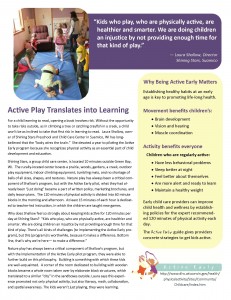For a child learning to read, opening a book involves risk. Without the opportunity to take risks outside, as in climbing a tree or catching crayfish in a creek, a child won’t be as inclined to take that first risk in learning to read. Laura Shallow, owner of Shining Stars Preschool and Child Care Center in Suamico, WI has long-believed that the “body wires the brain.” She devoted a year to piloting the Active Early program because she recognizes physical activity as an essential part of child development and education.
Shining Stars, a group child care center, is located 10 minutes outside Green Bay, WI. The rurally-located center boasts a prairie, woods, gardens, a creek, outdoor play equipment, indoor climbing equipment, tumbling mats, and no shortage of balls of all sizes, shapes, and textures. Nature play has always been a critical component of Shallow’s program, but with the Active Early pilot, what they had already been “just doing” became a part of written policy, marketing brochures, and daily lesson plans. The 120 minutes of physical activity is divided into 60 minute blocks in the morning and afternoon. At least 15 minutes of each hour is dedicated to teacher-led instruction, in which the children are taught new games.
Why does Shallow feel so strongly about keeping kids active for 120 minutes per day at Shining Stars? “Kids who play, who are physically active, are healthier and smarter. We are doing children an injustice by not providing enough time for that kind of play. There’s all kinds of challenges [to implementing the Active Early program], but this [program] is worthwhile, because it makes a difference. Bottom line, that’s why we’re here— to make a difference.”
Nature play has always been a critical component of Shallow’s program, but with the implementation of the Active Early pilot program, they were able to further build on this philosophy. Building is something with which these kids are well-acquainted. A corner of the room dedicated to building with wooden blocks became a whole room taken over by elaborate block structures, which translated to a similar “city” in the sandboxes outside. Laura says this experience promoted not only physical activity, but also literacy, math, collaboration, and spatial awareness. The kids weren’t just playing, they were learning.
Get the PDF:
Funding for Active Early 2.0 was provided by the UW School of Medicine and Public Health from the Wisconsin Partnership Program.
Why Being Active Early Matters
Establishing healthy habits at an early age is key to promoting life-long health. Movement benefits children’s:
- Brain development
- Vision and hearing
- Muscle coordination
Activity benefits everyone. Children who are regularly active:
- Have less behavioral problems
- Sleep better at night
- Feel better about themselves
- Are more alert and ready to learn
- Maintain a healthy weight
Early child care providers can improve child health and wellness by establishing policies for the expert recommended 120 minutes of physical activity each day. The Active Early guide gives providers concrete strategies to get kids active.

